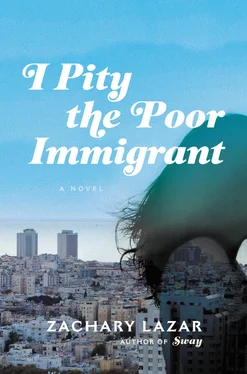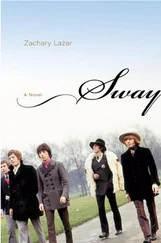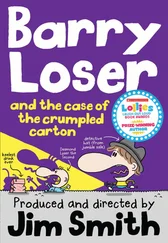“Why not?”
“I don’t know. I guess, what, I’m insecure.”
“I’m sorry things worked out the way they did the last time. I read your Bellen piece. There were other things that happened between us too. Better things. You didn’t write about those things quite as much.”
The drinks came, and then after a silence he finally sighed and said he couldn’t stay long, he had work the next day. He looked down at his hand on the table — impatience, contempt, I wasn’t sure what he was feeling at that moment. I was surprised by the solemn cast to his face. I saw how easy it would be to touch his hand, to run my fingers down the cuff of his jacket to his wrist — I wanted to touch him and I didn’t really understand why. The last time I’d touched him, more than two years ago, he had hit me.
“I sometimes thought about you too,” I said then, sipping my wine. “But then I thought about how you live here and I live there and what a waste of time it would be to keep thinking about you.”
He reached across the table and put his hand on my bare arm. I thought he might even try to kiss me, but he just looked at his hand there. It was a physical sensation, I told myself, only that. It was mostly just a consequence of doing this story, almost a coincidence in that way.
I told him the story of Gila then, sitting there in the mostly empty lobby of the Dan Hotel, showing him the pictures I’d taken on Be’eri Street, and the picture of Gila and me at lunch. Gila and Lansky. Gila and Bellen. Gila and my father. I could somehow sense that Voss didn’t believe all or even most of what I was saying, that he was even more incredulous than I might have expected, but I could also sense that incredulity for Voss was a common enough feeling — he’d heard a lot of stories he didn’t believe. If he was surprised to find me purveying another such story, then he was also forbearing. It was as if he thought it could happen to anyone, not deliberately lying but believing and then recounting a story that could never be verified.

Later, he parked on the street across from my hotel — I couldn’t afford to stay at the Dan — and we walked past the African guard into the drab lobby with its glass tables and Judaica. There were people sleeping on the couches with their luggage, waiting for check-in time the next morning. It was the last night of Hanukkah and there were menorahs out with eight candles burning in each, as well as a large electric menorah with waxy plastic arms, all of them lit up orange. Something about the plastic menorah made me wonder if I was going to be able to sustain whatever impulse had led me this far with Voss. There was a crowd in the elevator, Orthodox Jews speaking French. They didn’t look at us.
My clothes were scattered all over my tiny room. It was a glimpse into my life, like opening a diary. He reached for me — not hard but just testing it, touching my arm, above the elbow. He was a head taller than me, and I had to tilt my face up when he pushed his fingers into the hair at the base of my skull and leaned over me. His mouth tasted like cigarettes, but I wanted him and so the staleness just tasted like Voss, his old indifferent self. The room was too dark when I switched off the lights, so I left the one on in the bathroom. It cast a faint reflection on the glass of the framed painting opposite the bed. It doesn’t happen often, the slide into a vagueness that you didn’t instigate or even try to shape. The feeling takes in the shadows of the room, the orange glow behind the window, the clock radio and the phone on the night table. His BlackBerry buzzed from the pocket of his pants on the floor, the ringer turned off. It would buzz for a while, then stop, then buzz once more when someone left a message.
“I didn’t expect all this,” I said.
His face was just above mine, his lips not far from my ear. “You know my story now. The war story.”
“You never thought about living somewhere else after a story like that?”
“That story’s the reason I have to live here.”
“Then I guess I don’t understand.”
“I don’t expect you to understand. I’m just explaining why.”

My flight left a little before midnight the next night. Voss put my luggage in the trunk and then he sat in the driver’s seat, his face dim in the angled glow of the streetlight, his beard harsh against his cheek. His little black car had a combination lock that made loud shrill beeps when he punched in the code in the dark. I touched the sleeve of his coat and he held my hand for a second or two, then put the car into gear. We drove onto the highway toward the airport, listening to the radio, the commentator reporting the news in Hebrew in a voice somehow urgent but reassuring at the same time. I couldn’t understand anything he was saying, but I took in the general ambience. It was as if his reporting of the events in such a sane tone could render those events harmless, rational rather than emotional, almost theoretical. I asked Voss once again about the investigation into Bellen’s death and he told me, as he’d told me many times, that investigations like that seldom yield results, that cases like Bellen’s are almost never solved. I realized that knowing who actually killed Bellen no longer mattered as much to me as it once had. I realized that it would only lead to the greater mystery of why anyone kills anyone — why violence persists and why we continue believing or hoping that someday it will stop. That was the question Bellen explored in his work, the reason he wrote Kid Bethlehem and the reason he wrote “I Pity the Poor Immigrant.” It was not in the hope of finding an answer, I thought, but in the hope of creating a space in which to think through the question. He was thinking about it in the days before he died, I knew now, walking to the apartment at 4 Be’eri Street where he and Gila and Lansky had all found a few moments of respite in a country that, perhaps more than any other, foregrounds the transience of our lives.
At the airport, I gave Voss a kiss and looked into his eyes. You want to close your eyes, but if you leave them open and look it’s a way of holding on to them. There in the drop-off lane I kept my face close to his for a long moment. The fatigue made everything light, slow, increasingly deliberate. I was thinking of my father — that old cliché about the allure of unavailable men. But as that other old cliché goes, clichés are always truer than we’d like to believe. Perhaps I was just more simplistic than I liked to believe. More simplistic and more adrift.
“I’ll see you,” I said.
“I hope so.”
“You will. You’ll come to New York.”
We said goodbye and he watched me as I walked my suitcase through the terminal’s sliding doors and headed for the check-in line. I didn’t turn around. I should say that I imagine he was watching me as I walked through the doors.

That May, they started jury selection in my father’s trial. I thought, I should call him. He should call me . But I was in the middle of writing this book and we both knew that in some ways this book, like most of my writing, is a commentary on us, on our past. My father knew that I was including him here not only because of what he has told me but because of what he hasn’t told me. Because of what I suspect, not only about his current predicament but about his life. You’re my daughter, he’d said when I told him I was going ahead with this project. Even then, I don’t think it was just the story of his affair with Gila that troubled him. I think it was the larger story and the fact that I was going to place him inside it. I had never thought I had the kind of family it was possible to “dishonor”—my family wasn’t given to such old-fashioned notions — but that’s one way I found myself interpreting his silence now. The more I thought about it, the more I understood this book as a kind of betrayal. I don’t have any children of my own. I have never wanted children and I no longer know what that says about me. I know and have known for a long time now that my alienation is just alienation, not a sign of any deeper spiritual insight. I know that, but I don’t know what to do with the alienation itself. There’s a condition called Jerusalem Syndrome in which visitors to the city fall into religious-tinged delusions or even psychosis, as if the very atmosphere there is permeated with madness. The affected people tend to recover shortly after they return home. Almost all of them do.
Читать дальше













